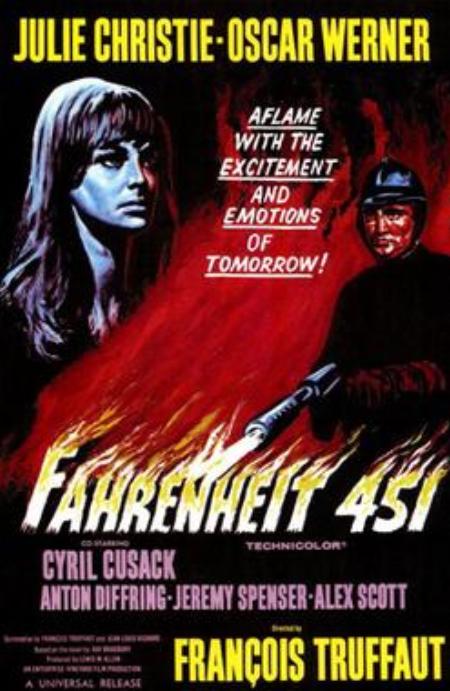Movies I'm watching: Fahrenheit 451 (1966)
In a dystopian future where books are banned, a profession meant to save lives turns into a destructive force that dominates all aspect of society.

"Fahrenheit 451 (1966)" is a good mix between science fiction and political commentary. It is based on Ray Bradbury's 1953 novel of the same name.
Plot
The story takes place in a dystopian future where books are considered either useless or malignant, therefore forbidden by law. When found, a special unit called "The Firemen" are called to collect them and burn them with prejudice and as public statement.
The main character, Guy Montag, is a fireman rising among the ranks and begins to be noticed and respected by his superior for his continued stellar performance.
After an encounter with a peculiar woman, Montag (as he is addressed by all in the movie) starts to take an interest in books. By reading about lost histories, sciences, and philosophy, Montag starts to question the reality of the civilization in which he lives and the nature of his work.
Montag's conflict between his new found love of knowledge, his old loyalties to his mentor and coworkers eventually comes at a breaking point when, during a book burning operation at his own home, he chooses the road of books and burns his superior alive.
Now a fugitive, Montag manages to evade capture by fleeing the city. Following directions given to him by his rebel book friend, Montag finds the mythical group of people named the "Book People". This group of fugitives lives in a colony out of the reach of the city and are dedicated to preserving books by having each one of them memorize an entire book.
Upon memorizing it, the book is burned. Now the person becomes the book itself, changing their name to that of the title of the book. This act they believe, will preserve the text of the book inside of them until such a time when society is ready to experience its content once again.

Commentary
Besides the obvious messaging of the movie warning us about the dangers of banning knowledge, there are many secondary and subtle aspects that I equally enjoyed.
Since knowledge is forbidden and words carry knowledge, society has evolved to work with as little written language as possible. This can be seen when Montag gets home tired after a hard day of work and opens the newspaper to wind down. However the newspaper is only filled with simple and colorful imagery akin to that of a comic book.
In another instance of such a society voided of text, employee files and criminal records contain only pictures of the individuals. Instead of a rap sheet, record of criminal activies is encoded using simple geometrical figures.
Without words society becomes infantilized. This can be seen in the interactions of the characters between themselves and with the media. Montag's wife thinks the television soap opera characters are actually communicating with her, just like a child might as they answer questions posed by a character in a cartoon aimed at preschooler.
Besides the warning about the retrograde effects of banning knowledge, the movie presents a subtle warning about totalitarianism and authoritarianism. This is evidence by how people address each other as "cousins". Newscasters and TV presenters address their audience as "cousins" too. Society is seen by the individuals in the movie as a single unit, as a "family". Since everybody is part of the same "family", uniformity and compliance are expected without exception.

Although not frequently presented, historical revisionism is a core part of the mythos of the film. The firemen are responsible for burning books, rather than putting out fires, and the origins of this profession is depicted as having a long history, dating back to the days of Benjamin Franklin, who is portrayed as a fireman himself burning books.
To me this revisionist portrayal of firemen and Ben Franklin is what adds the deepest darkest feelings to the dystopian and oppressive atmosphere of the film. It distorts a symbol of safety and protection into something sinister, oppressive, and destructive. It is a stern commentary on the dangers of rewriting history and manipulating people's perception of the past and of their culture.

The acting in the movie is top notch. Even though the cinematography techniques of the movie are 57 years apart from what we see today, there is never a dull moment. The pacing is enjoyable and easy to follow without getting boring. With the exception of some flying firemen nearing the end, all visuals made sense.
One particular aspect of Oskar Werner who plays Montag, is that to my ears, his voice sounds like that of Michael Caine. And to some extends his facial features also bear some resemblance to those of Caine. For a good part of the movie I was convinced it was a young Michael Caine on his early career.
I enjoyed the entire movie but specially loved the ending.
In conclusion Fahrenheit 451 (1966) is a classic that is definitely worth watching, and one that will stay with you long after the credits have rolled.